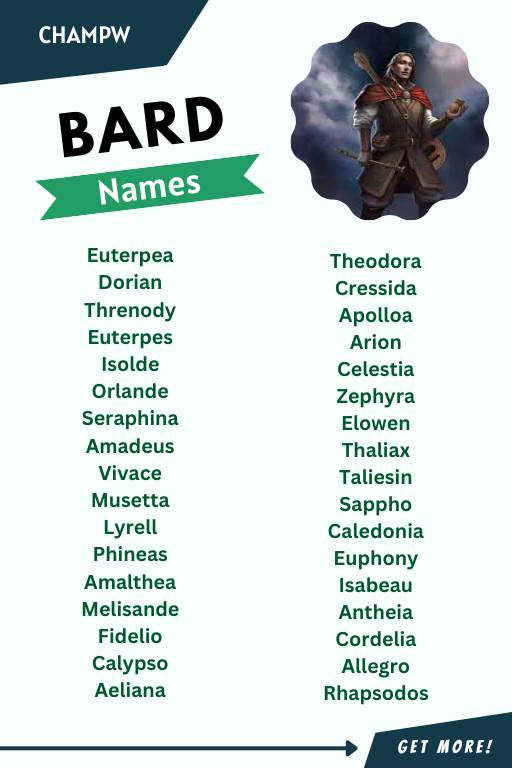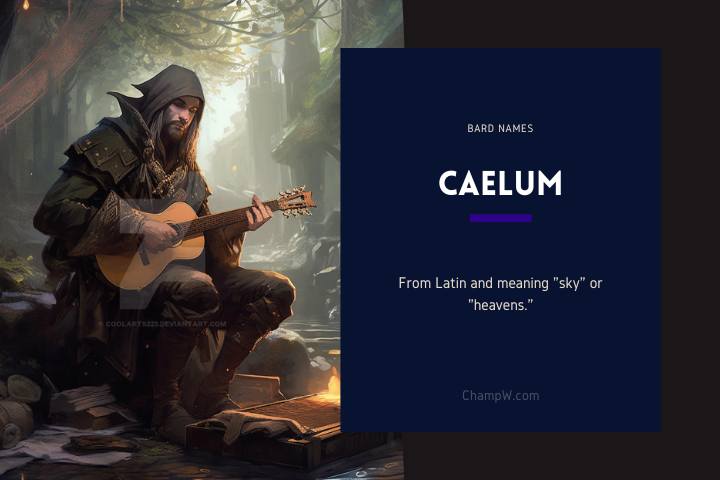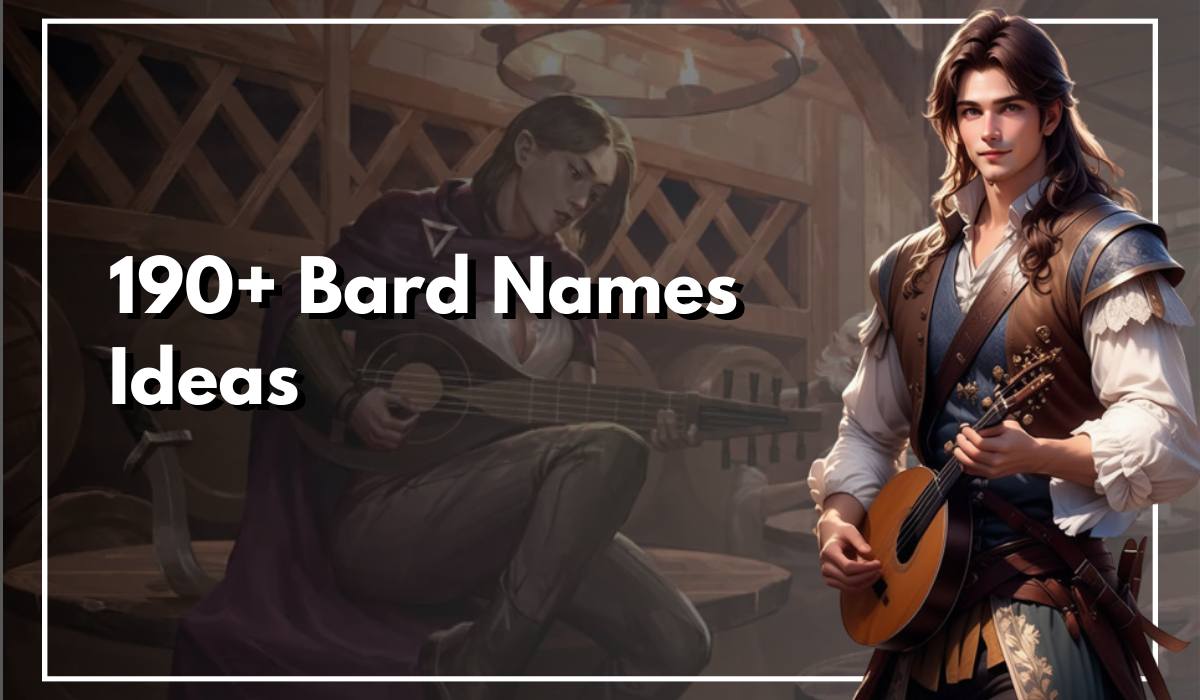Do you like reading fantasy books or playing role-playing games? If so, you’ve probably heard of the magical and interesting world of bards. Many people are interested in these characters because they are charming and good at music. They can use music to tell stories and cast magic. However, have you ever thought about what their names mean? This piece will delve into the fascinating world of bard names, looking at where they come from, what they mean, and how they were chosen.
We will examine the historical and cultural influences that shape these names, the symbolism they carry, and the impact they have on the overall character development. So, let’s embark on this journey and unravel the secrets behind the enchanting names of bards.
Bard Names
Looking for the perfect bard name? Explore a diverse collection of enchanting and memorable names to elevate your fantasy world.
- Thalia: A Greek poetic and comedic inspiration.
- Orpheus: Poet and legendary musician according to Greek mythology.
- Lyra: A constellation bearing the name of the musical instrument lyre.
- Minstrel: A performer of narratives and music.
- Serenade: A musical performance that is traditionally performed in honor of a cherished individual.
- Melody: A series of melodic signs that compose an entire melody.
- Aria: A vocal solo performed in an opera.
- Lyrical: Concerning the musical expression of emotions.
- Cadence: The flow or rhythm of discourse or music.
- Ballad: Typically, a narrative composition tells a story.
- Harmony: An aesthetically appealing amalgamation of distinct musical tones.
- Crescendo: A progressive escalation in the intensity or volume of music.
- Rhapsody: An epic sonnet or piece of music.
- Sonata: An opus that is customarily performed by a solitary instrument.
- Chord: A collection of musical notes performed in unison.
- Fandango: An animated Spanish musical performance.
- Euterpe: Inspired by Greek music and lyric poetry.
- Calliope: The Greek goddess of eloquence and epic poetry.
- Terpsichore: The Greek Muse of Choral Poetry and Dance.
- Clio: Greek historical muse and lyre performer.
- Polyhymnia: The Greek Muse of eloquence and sacred poetry.
- Erato: The Greek Muse associated with love poetry and impersonation.
- Melpomene: The Greek inspiration for choral music and tragedy.
- Apollo: Poet, musician, and patron deity of the arts.
- Siren: Mysterious beings renowned for their mesmerizing vocalizations.

Funny Bard Names
Looking for unique and humorous bard names? Explore our collection of funny character name ideas to add a playful twist to your role-playing adventures.
- Troubadour: Poets and musicians of the Middle Ages who composed love melodies.
- Chanteuse: An often-seen female performer in cabarets and nightclubs.
- Capella: A reference to the Auriga constellation component star Capella.
- Dervish: An adherent of a Muslim order renowned for its musical and performance traditions.
- Minuet: A graceful and sluggish dance that is frequently performed in triple meter.
- Nocturne: An instrumental work that drew inspiration from the nocturnal.
- Overture: The musical composition that commences an opera or ballet.
- Panache: Elegantly flamboyant and fashionable.
- Serenata: Its Italian equivalent is “serenade,” which refers to a charming musical rendition.
- Virtuoso: An accomplished musician or performer with exceptional ability.
- Zephyr: A warm, moderate breeze.
- Allegra: The Italian word for “jubilant” or “vibrant.”
- Cantabile: Song or “Singable” in Italian
- Crescenda: An alternative form of the term “crescendo,” which denotes an escalating fervor in musical composition.
- Elysia: A reference to the Greek mythological paradise of Elysium.
- Phoebe: An alternative appellation for the moon or the Greek titan that is linked to it.
- Lyricus: An affixation of the word “lyrical,” signifying poetic attributes.
- Cadenza: A concerto solo section in which the conductor employs improvisation.
- Callista: Very beautiful is the Greek word for “most beautiful.”
- Amaryllis: An arboreal species that is correlated with pastoral poetry.
- Icarus: The legendary individual who ascended too near to the sun.
- Thespian: Concerning theatre and dramatics.
- Aurora: The dawn deity of Roman mythology.
- Perseus: A Greek mythological hero renowned for killing Medusa.
- Echo: An elemental being from Greek mythology whose voice echoed.
Dnd bard names
Discover captivating Dnd bard names to inspire your next character. Unleash the power of music and magic in your role-playing adventures!
- Luthier: A manufacturer of stringed instruments, including violins and lutes.
- Euterpea: An alternative form of “Euterpe,” the musical Muse.
- Dorian: A mode of music that was utilized in ancient Greece.
- Threnody: A lamentatory or mournful melody.
- Euterpes: By way of pluralizing “Euterpe,” which emphasizes musical inspiration.
- Isolde: A character from the opera by Wagner and the Arthurian legend.
- Orlande: The heroic Orlando is alluded to in epic poetry.
- Seraphina: Seraphim, which translates to “fiery” or “angelic.”
- Amadeus: Known in Latin as “lover of God,” this term is closely linked to Mozart.
- Vivace: The Italian word for “vivacious” or “lively.”
- Musetta: A member of the cast of Puccini’s “La Bohème.”
- Lyrell: An uncommon fusion of the terms “lyre” and “mystical.”
- Phineas: The biblical appellation for this individual signifies “oracle” or “serpent’s mouth.”
- Amalthea: In Greek mythology, a goat served as Zeus’s caregiver.
- Melisande: A character from the opera “Pelléas et Mélisande” by Debussy.
- Fidelio: The sole opera composed by Beethoven, denoting “faithful.”
- Calypso: A Greek mythological goddess renowned for her vocal prowess.
- Aeliana: An alteration of the name “Aelius,” which translates to “Sun.”
- Theodora: translated from Greek as “gift of God.”
- Cressida: Shakespearean character from “Troilus and Cressida.”
- Apolloa: A feminine form of the name “Apollo.”
- Arion: A musician and legendary poet in Greek mythology.
- Celestia: The Latin word for “celestial” or “heavenly.”
- Zephyra: The feminine form of the noun “zephyr,” which translates to “breeze.”
- Elowen: From Cornish, “elm tree.”
Cool Names for Bard
Discover unique and captivating bard names for your character. Find cool and inspiring monikers for bards that will set your story apart!
- Thaliax: An uncommon form of the name “Thalia.”
- Taliesin: An individual of Welsh mythology legend.
- Sappho: A lyric poet of ancient Greece renowned for her love poems.
- Caledonia: Scotland’s Latin name, which signifies a notion of location.
- Euphony: The characteristic of eliciting pleasant auditory responses.
- Isabeau: Isabelle is a variant of the name “Isabel.”
- Antheia: Deity of flowers and floral garlands in Greek mythology.
- Cordelia: Shakespearean character from “King Lear.”
- Allegro: Tempo is a musical notation that signifies “rapid and animated.”
- Rhapsodos: An alternative form of the noun “rhapsody” or “rhapsodist.”
- Auroraia: An eloquent reinterpretation of “Aurora.”
- Pantheia: An appellation imbued with an inherent affinity for the natural world.
- Helios: The sun god of ancient Greece.
- Calista: Most beautiful is Greek for “most beautiful.”
- Serenata: From the Italian for “serenade,” which conjures up images of romantic music.
- Artemis: Goddess of the chase and the wilderness in Greek mythology.
- Calypsa: An adaptation of the divinity “Calypso,” who sings.
- Amarante: The French word for “everlasting” or “unfading.”
- Meliora: The Latin word for “more beautiful” or “better.”
- Rinaldo: A persona found in epic poetry from Italy.

Female bard names
Seeking inspiration for female bard names? Delve into our collection of melodic and evocative names that will add a touch of whimsy to your narratives.
- Crescendia: An uncommon form of the word “crescendo.”
- Thalassia: A poetic allusion to the ocean or sea.
- Evadne: Well or “pleasing” in Greek
- Silvanus: Deity of the Roman forests and pastures.
- Iliad: The Homeric-attributed epic composition.
- Solange: The French word for “dubious” or “eminent.”
- Bardolph: A comedic character from Shakespeare.
- Fandango: An animated Spanish musical performance.
- Terpischore: The Greek Muse of Choral Poetry and Dance.
- Lysander: Shakespearean character from “A Midsummer Night’s Dream.”
- Meliboea: An appellation imbued with poetic and pastoral allusions.
- Elysium: According to Greek mythology, Elysium.
- Persephoneia: An extended poetic rendition of the proverb “Persephone.”
- Isolabella: By fusing the words “Bella” and “Isolde” (beauty).
- Lyraena: An altered poetic form of “Lyra.”
- Asterope: The definition of a star in the Pleiades cluster is “starry.”
- Caledonius: A reference to Scotland in Latin.
- Valerian: Latin for “healthy” or “powerful.”
- Althea: Healing or ” Wholesome” in Greek.
- Chrysanthe: The Greek word for “golden flower.”
- Calais: Speedy or “swift” in Greek.
Good bard names
Looking for good bard names? Explore our extensive list of enchanting and inspiring names to elevate your role-playing experience.
- Eirene: The goddess of calm in Greek mythology.
- Seraphiel: The fusion of the names “seraphim” and “El” (Deity).
- Astraia: From Greek, “star maiden.”
- Theodorus: translated from Greek as “gift of God.”
- Mercurius: for “Mercury,” the messenger deity, in Latin.
- Bardella: Bard rendered in diminutive form with a feminine inflect.
- Polydorus: From Greek, “many gifts.”
- Amaranta: Amarante, an alternative form denoting “unfading.”
- Sapphira: A gem-like substance
- Isadora: Given the appellation “gift of Isis,” the deity from ancient Egypt.
- Thalassa: The Greek word for “ocean” or “sea.”
- Alaric: An appellation that signifies “ruler of all” or “ruler of all people.”
- Althaea: The Greek word for “wholesome” or “healer.”
- Arion: A musician and legendary poet in Greek mythology.
- Callixtus: Most beautiful is Greek for “most beautiful.”
- Dianthe: A name formed from the words “Diana” (a Roman deity) and “anthe” (a flower).
- Elara: A moon of Jupiter bearing the name of a Greek mythological companion of Zeus.
- Tiresias: A prophet who was blind according to Greek mythology.
- Eirena: An alteration on the Greek goddess of calm, Eirene.
- Maenad: Dionysus’ female devotees are notorious for their irrational dance.
- Cymbeline: A title of a drama and a character from Shakespeare.
- Melisandra: An assemblage of the names “Melissa” and “Sandra.”
- Altair: An Aquila constellation star whose name translates to “the flyer.”
- Caelum: From Latin and meaning “sky” or “heavens.”
- Elara: A moon of Jupiter bearing the name of a Greek mythological companion of Zeus.
Tiefling bard names
Seeking the perfect Tiefling bard name? Explore our curated collection of captivating names that will bring your character to life in any fantasy world.
- Leonidas: Name denoting “lion”
- Serendipity: For favorable events to transpire by coincidence.
- Castalia: In Greek mythology, a spring serves as an inspiration for poetry.
- Seraphine: Seraphina, an alternative form denoting “fiery” or “angelic.”
- Nereus: An ancient Greek marine deity.
- Zephyrine: The feminine form of the noun “zephyr,” which translates to “breeze.”
- Apolloius: An extraordinary variant of “Apollo.”
- Lysandra: The fusion of the names “Lysa” and “Andra,” which translates to “liberator of man.”
- Calantha: The Greek word translates to “beautiful flower.”
- Antigone: A tragic Greek mythological heroine.
- Cleopatra: The renowned Egyptian monarch was renowned for her beauty and intelligence.
- Isoldean: An altered form of “Isolde.”
- Theocritus: A poet of ancient Greece whose work was pastoral in nature.
- Lyricus: A variant of the poetic word “lyrical.”
- Persephoneia: An extended poetic rendition of the proverb “Persephone.”
- Thespis: The pioneer of Greek theatre, a legendary figure.
- Selene: Moon deity in Greek mythology.
- Caligula: A Roman emperor notorious for his eccentricity and extravagance.
- Auroraia: An eloquent reinterpretation of “Aurora.”
- Amarys: An uncommon form of the word “Amaryllis.”
- Parnassus: An Aegean peak that is correlated with the Muses.
- Alcibiades: A historical persona renowned for her attractiveness and intelligence.
- Serenada: Sentential equivalent of “serenade.”
- Callimachus: A Greek poet whose work included epigrams.
- Philomela: The transformation of a character from Greek mythology into a nightingale.
Clever names for Bard
Find the best clever names for Bard characters and leave a lasting impression in your gaming community. Explore our top picks and stand out!
- Euterpenia: An analogous form of “Euterpe.”
- Artemisia: The feminine etymology of “Artemis.”
- Calisto: Most beautiful is Greek for “most beautiful.”
- Sapphic: In regard to the poetic works of Sappho.
- Allegria: The Italian word for “happiness” or “joy.”
- Elyssia: Such a derivative of “Elysium.”
- Zephyrian: In reference to “Zephyr,” the mild airflow.
- Orestes: A legendary Greek figure renowned for seeking vengeance against his father.
- Melpomenia: A variant of the poetic term “melpomene.”
- Damaris: gentleness or “calf” in Greek.
- Oread: A mythical mountain maiden in Greek folklore.
- Seraphiel: The fusion of the names “seraphim” and “El” (Deity).
- Callidora: Greek for “beautiful gift.”
- Orphelia: An eloquent citation of “Ophelia.”
- Cressentia: An uncommon form of the word “crescendo.”
- Amaltheus: A variant on the Greek mythological figure “Amalthea,” the nurturing goat.
- Bardolfina: The female equivalent of “Bardolph.”
- Apolloanna: The feminine equivalent of the name “Apollo.”
- Polyxena: A Greek mythological figure renowned for her attractiveness.
- Pantheon: The term “temple dedicated to all the gods” is mentioned.
- Selenea: A variant of the poetic term “Selene.”
- Lyron: An uncommon fusion of the words “lyre” and “on.”
- Orpheana: A variant of the poetic term “Orpheus.”
- Apollothus: An extraordinary variant of “Apollo.”
Also Read:
Final Words
Bard names hold a significant place in the world of literature and storytelling. They serve as a representation of the bard’s identity and are often carefully chosen to reflect their persona, skills, and aspirations. Whether historical or fictional, these names have the power to evoke a sense of mystery, charm, and creativity. As we continue to appreciate the art of storytelling and poetry, let us also celebrate the significance of bard names in preserving cultural heritage and igniting our imagination.
